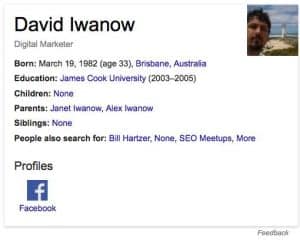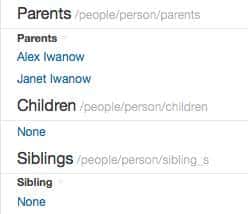I was searching and looking through the SERPs of some of the people I hung out with last week at SMX Advanced in Seattle. I noticed a rather odd thing showing up in the search results for David Iwanow, where the word “none” is showing up several times in the SERPs (search results pages). Take a look:
This is the knowledge graph entry that shows up next to the search results. For David Iwanow’s entry, he has this showing up:
Children: None
Siblings: None
It all makes sense to us, right? David has no children, and he has no siblings. But if you look further, you’ll notice this:
Well, apparently people also search for “None”. Yes, “none”. Google apparently doesn’t really understand what none means.
People who search for David also search for me, and that would make sense because we’re in the same industry. But where does Google get the information that people also search for “none”? Well, apparently they don’t actually get that information from the search history. Because, frankly, I don’t think that people would actually search for the word “none”. It’s just not feasible.
So, looking into this further, it appears that Google is (still) taking this information from Freebase.com, as that’s where the original information (None) appears:
Here’s David Iwanow’s freebase page: http://www.freebase.com/m/01025462
What makes sense is that since the word “None” is actually a Freebase page, and has been designated as a Freebase entity, a part of the knowledge graph that actually has an entry, Google is interpreting “None” as an entity. And not “none” as in “nothing”. So, when Google shows us that people also searched for “none”, then there’s a good chance that Google could be using data from Freebases searches; and/or they could be relating clicks on the “None” entry on David Iwanow’s Freebase page (or on the search results page) to actual searches for “None”.
Whatever the case, and whatever the reason behind Google showing “None” as something that people also search for, doesn’t really matter. What matters to me is that Google truly doesn’t really understand the meaning of “None”. With all the technology behind semantic search and the knowledge graph coming into play here, you’d think that Google understands what “None” means.
But apparently not.


